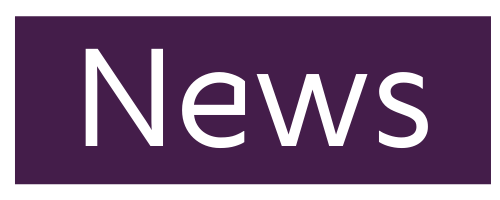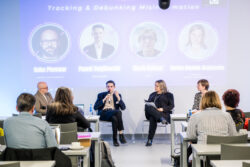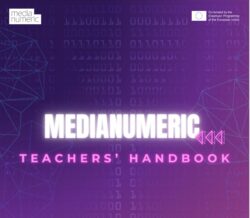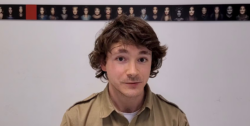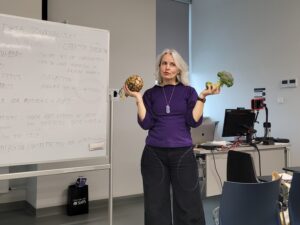With less than a week to go before the first MediaNumeric training programme kicks off in Paris, the official programme has been announced. Speakers from across Europe will work together with students on topics from data literacy and multimedia storytelling to open source search intelligence and the social impact of journalism. A detailed look into the exciting six-day programme can be found below.
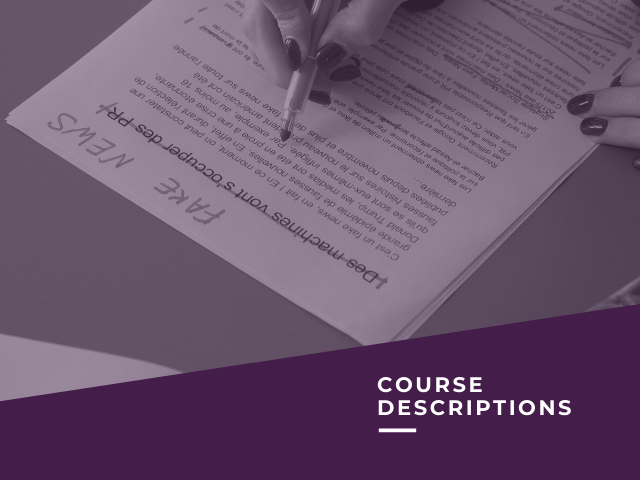
Day 1
Stratgies of the data search
with Gary Dagorn
A quick introduction to explain how to find, process and use online data when writing a data-driven story. It includes learning basic knowledge of search techniques, Open Data and the legislation surrounding it, as well as some examples of how to format / process / visualise them to add informative value to your story.
Data literacy
with Gijs van Beek
This lecture covers matters such as what data literacy is, artificial intelligence & machine learning, about Textgain, machine learning & NLP: an experiment, big data & social media, and social media monitoring: the echo-chambers.
Day 2
Tools & databases: basic principles + choice of apps
with Héloïse Théro
The internet is a powerful medium from which all kinds of data can be extracted. In this class, we will see how web crawling can be used to visualize the relationships between different websites, and thus build a “web of knowledge” on a specific topic. We will also see how we can extract specific data from web pages by using web scraping. For example, you can easily download the results of a Google search, or all the tweets containing a specific hashtag or keyword. Finally we will see how different databases can be accessed on the web, such as the metadata of YouTube videos. There are no coding skills necessary to follow the class, the goal is only to acquire a general culture about web data and how it can be extracted.
Panorama of multimedia storytelling and the contributions of data. State of the art of storytelling multimedia. Why tell a story with data?
with Julie Brunet
Why and how do we use data in telling a story? Two main questions we’ll try to answer in this lecture with a quick panorama of multimedia storytelling and by discussing examples of successful and innovative uses of data in the newsroom.
The main stages of a data project, from data exploration to storytelling
with Dario Compagno
In order to produce a data analysis one has to move through several steps. Firstly, one needs to understand the context of the analysis: what are the needs grounding it? How can these needs be translated into research questions, and then into data collection? This requires intuition and clear ideas about our aims and means. Once we have this sorted out, the practical work begins. Data has to be treated for visualisation and modeling. It’s here that software knowledge becomes central. In the end, our work has to be brought to the relevant public, so graphical and writing skills should now lead the way. This module will try to identify the most important points to check at each of these steps.
Day 3
Techniques and tools adapted to multimedia storytelling. The different techniques for designing a data storytelling project
with Julie Brunet
In this lecture, we’ll consider all the actors involved in a data storytelling project and their mutual tools before focusing on Flourish, a free online data visualisation tool.
Media Ethics
with Mirosław Filiciak
The Media Ethics course is devoted to ethical dilemmas related to journalistic work – with tools to solve them and examples of good practices. The focus of the class is aimed at challenges that have arisen with the transformations of the media ecosystem, ranging from the functioning of classic problems in the environment of blurred categories, and ending with specific issues related to Big Data and data visualization.
Day 4
Debunking dis/misinformation and digital manipulation
with Marion Dautry & Robert Barca
A deep dive into open-source tools that can be used to investigate, track, and debunk dis/misinformation and digital manipulation. Students will learn advanced search criteria, geolocation, image analysis tools and other techniques to identify manipulated content. They will also learn the importance of accountability and how to record their investigation so that their work stands up to scrutiny.
Confronting the misinformation universe
with Marion Dautry & Robert Barca
What is disinformation and misinformation? How do you recognize it? Where does it come from? How does it circulate, particularly on social media? Students will gain an understanding of a trend that has been identified as one of the biggest threats to democracy. They will learn where to start the process of verification and the basic tools to debunk manipulated content.
Day 5
Social impact of journalism and media transition
with Mirosław Filiciakq
The Social impact of journalism and media transitions course systematizes knowledge about the social consequences of Internet proliferation. Its theme is the emergence of new media structures and forms, but also the appearance of new intermediaries in the distribution of information, with growing importance of the technological component, which changed the way the public sphere functions.
Day 6
Study visit to Agence France-Presse
with Jacqueline Pietsch
Agence France-Presse (AFP) is a leading global news agency providing fast, comprehensive and verified coverage of the events shaping our world and of the issues affecting our daily lives. Drawing from an unparalleled news gathering network across 151 countries, AFP is also a world leader in digital verification, verifying content on social media platforms in 24 languages. With 2,400 staff representing 100 different nationalities, AFP covers the world in six languages, with a unique quality of multimedia storytelling spanning video, text, photos and graphics.
